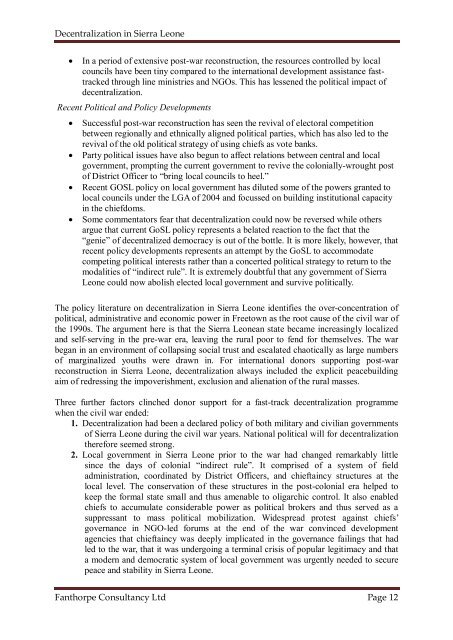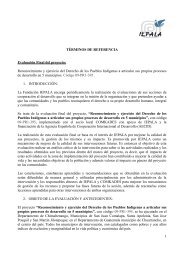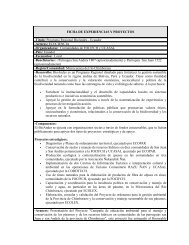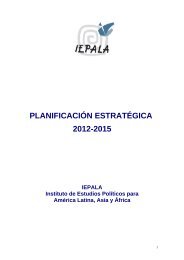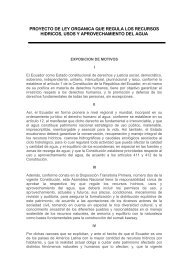Decentralization in Sierra Leone - Research for Development
Decentralization in Sierra Leone - Research for Development
Decentralization in Sierra Leone - Research for Development
Create successful ePaper yourself
Turn your PDF publications into a flip-book with our unique Google optimized e-Paper software.
<strong>Decentralization</strong> <strong>in</strong> <strong>Sierra</strong> <strong>Leone</strong> In a period of extensive post-war reconstruction, the resources controlled by localcouncils have been t<strong>in</strong>y compared to the <strong>in</strong>ternational development assistance fasttrackedthrough l<strong>in</strong>e m<strong>in</strong>istries and NGOs. This has lessened the political impact ofdecentralization.Recent Political and Policy <strong>Development</strong>sSuccessful post-war reconstruction has seen the revival of electoral competitionbetween regionally and ethnically aligned political parties, which has also led to therevival of the old political strategy of us<strong>in</strong>g chiefs as vote banks.Party political issues have also begun to affect relations between central and localgovernment, prompt<strong>in</strong>g the current government to revive the colonially-wrought postof District Officer to “br<strong>in</strong>g local councils to heel.”Recent GOSL policy on local government has diluted some of the powers granted tolocal councils under the LGA of 2004 and focussed on build<strong>in</strong>g <strong>in</strong>stitutional capacity<strong>in</strong> the chiefdoms.Some commentators fear that decentralization could now be reversed while othersargue that current GoSL policy represents a belated reaction to the fact that the“genie” of decentralized democracy is out of the bottle. It is more likely, however, thatrecent policy developments represents an attempt by the GoSL to accommodatecompet<strong>in</strong>g political <strong>in</strong>terests rather than a concerted political strategy to return to themodalities of “<strong>in</strong>direct rule”. It is extremely doubtful that any government of <strong>Sierra</strong><strong>Leone</strong> could now abolish elected local government and survive politically.The policy literature on decentralization <strong>in</strong> <strong>Sierra</strong> <strong>Leone</strong> identifies the over-concentration ofpolitical, adm<strong>in</strong>istrative and economic power <strong>in</strong> Freetown as the root cause of the civil war ofthe 1990s. The argument here is that the <strong>Sierra</strong> <strong>Leone</strong>an state became <strong>in</strong>creas<strong>in</strong>gly localizedand self-serv<strong>in</strong>g <strong>in</strong> the pre-war era, leav<strong>in</strong>g the rural poor to fend <strong>for</strong> themselves. The warbegan <strong>in</strong> an environment of collaps<strong>in</strong>g social trust and escalated chaotically as large numbersof marg<strong>in</strong>alized youths were drawn <strong>in</strong>. For <strong>in</strong>ternational donors support<strong>in</strong>g post-warreconstruction <strong>in</strong> <strong>Sierra</strong> <strong>Leone</strong>, decentralization always <strong>in</strong>cluded the explicit peacebuild<strong>in</strong>gaim of redress<strong>in</strong>g the impoverishment, exclusion and alienation of the rural masses.Three further factors cl<strong>in</strong>ched donor support <strong>for</strong> a fast-track decentralization programmewhen the civil war ended:1. <strong>Decentralization</strong> had been a declared policy of both military and civilian governmentsof <strong>Sierra</strong> <strong>Leone</strong> dur<strong>in</strong>g the civil war years. National political will <strong>for</strong> decentralizationthere<strong>for</strong>e seemed strong.2. Local government <strong>in</strong> <strong>Sierra</strong> <strong>Leone</strong> prior to the war had changed remarkably littles<strong>in</strong>ce the days of colonial “<strong>in</strong>direct rule”. It comprised of a system of fieldadm<strong>in</strong>istration, coord<strong>in</strong>ated by District Officers, and chiefta<strong>in</strong>cy structures at thelocal level. The conservation of these structures <strong>in</strong> the post-colonial era helped tokeep the <strong>for</strong>mal state small and thus amenable to oligarchic control. It also enabledchiefs to accumulate considerable power as political brokers and thus served as asuppressant to mass political mobilization. Widespread protest aga<strong>in</strong>st chiefs’governance <strong>in</strong> NGO-led <strong>for</strong>ums at the end of the war conv<strong>in</strong>ced developmentagencies that chiefta<strong>in</strong>cy was deeply implicated <strong>in</strong> the governance fail<strong>in</strong>gs that hadled to the war, that it was undergo<strong>in</strong>g a term<strong>in</strong>al crisis of popular legitimacy and thata modern and democratic system of local government was urgently needed to securepeace and stability <strong>in</strong> <strong>Sierra</strong> <strong>Leone</strong>.Fanthorpe Consultancy Ltd Page 12


